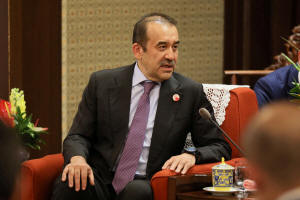Kazakhstan arrests ex-security chief as it presses crackdown on protests
 Send a link to a friend
Send a link to a friend
 [January 08, 2022]
By Olzhas Auyezov and Tamara Vaal [January 08, 2022]
By Olzhas Auyezov and Tamara Vaal
ALMATY (Reuters) - Kazakhstan's former
intelligence chief has been arrested on suspicion of treason, the state
security agency said on Saturday, as the former Soviet republic cracks
down on a wave of unrest and starts to assign blame.
The detention of Karim Massimov was announced by the National Security
Committee which he himself headed until he was fired by President
Kassym-Jomart Tokayev on Wednesday as violent protests swept across the
Central Asian nation.
Tokayev's office said he had told Russian President Vladimir Putin in a
phone call that the situation was stabilising.
"At the same time, hotbeds of terrorist attacks persist. Therefore, the
fight against terrorism will continue with full determination," it
quoted him as saying.
The Kremlin said Putin backed Tokayev's idea to convene a video call of
leaders from the Collective Security Treaty Organisation (CSTO), under
whose umbrella Russia and four other former Soviet republics have sent
troops into Kazakhstan to help restore order. It was not clear when this
would take place.
Dozens of people have died, thousands have been detained and public
buildings across Kazakhstan have been torched over the past week in the
worst violence experienced in the major oil and uranium producer since
it became independent in the early 1990s as the Soviet Union collapsed.

Tokayev has ordered his troops to shoot to kill to put an end to what he
has called attacks by bandits and terrorists.
He said on Friday the state had "slept through" instigators'
preparations to launch attacks on the biggest city, Almaty, and across
the country. The arrest of Massimov indicated that moves against those
deemed responsible are under way.
Apart from heading the intelligence agency that replaced the Soviet-era
KGB, Massimov is a two-time ex-prime minister who worked closely with
former President Nursultan Nazarbayev, the country's ruler for three
decades until he turned over the presidency to Tokayev in 2019.
The demonstrations across the country began as a response to a fuel
price hike but swelled into a broad movement against Tokayev's
Russian-backed government and 81-year-old Nazarbayev, whose family is
widely believed to have retained influence in Nur-Sultan, the capital
that bears his name.
[to top of second column]
|

Karim Massimov, chairman of the National Security Council of
Kazakhstan meets with Chinese Vice President Wang Qishan at
Zhongnanhai in Beijing, China April 8, 2019. Kenzaburo Fukuhara/Pool
via REUTERS/File Photo
 EAST-WEST TENSIONS
After several days of violence, security forces appeared to have
reclaimed control of the streets of Kazakhstan's main city Almaty on
Friday.
Some businesses and petrol stations began to reopen on Saturday in
the city of around 2 million people as security forces patrolled the
streets. Occasional gunshots could still be heard around the city's
main square.
The deputy mayor of the city was quoted by Russia's RIA news agency
as saying operations to purge the city of "terrorists and bandit
groups" were still under way and citizens were advised to stay at
home.
In Nur-Sultan, Reuters filmed police stopping drivers at a
checkpoint with a heavy presence of armed soldiers nearby.
The interior ministry said that more than 4,400 people had been
detained since the start of the unrest. Tokayev announced that a
national day of mourning would take place on Monday to commemorate
those killed in the unrest.
Access to the internet, which was been largely shut down across the
country for days, was still heavily disrupted on Saturday.
The deployment of the Russia-led CSTO military alliance in
Kazakhstan at Tokayev's invitation comes at a time of high tension
in East-West relations as Russia and the United States gear up for
talks next week on the Ukraine crisis.
Moscow has deployed large numbers of troops near its border with
Ukraine though it denies U.S. suggestions that it is planning to
invade the country, saying it wants guarantees that NATO will halt
its eastward expansion.
Washington has challenged the justification for sending Russian
troops to Kazakhstan and questioned whether what has been billed as
a mission of days of weeks could turn into a much longer presence.
"One lesson of recent history is that once Russians are in your
house, it's sometimes very difficult to get them to leave,"
Secretary of State Antony Blinken said on Friday.
(Reporting by Olzhas Auyezov and Mariya Gordeyeva in Almaty and
Tamara Vaal in Nur-Sultan; Additional reporting by Gabrielle
Tétrault-Farber in Moscow; Writing by Mark Trevelyan; Editing by
Pravin Char)
[© 2022 Thomson Reuters. All rights
reserved.] This material may not be published,
broadcast, rewritten or redistributed.
Thompson Reuters is solely responsible for this content. |